

Opening up for Many Voices in Knowledge Construction. Volume 13, No. 1, Art. 1 – January 2012 Opening up for Many Voices in Knowledge Construction Marit Borg, Bengt Karlsson, Hesook Suzie Kim & Brendan McCormack Abstract: The key epistemological assumption in participatory research is the belief that knowledge is embedded in the lives and experiences of individuals and that knowledge is developed only through a cooperative process between researchers and experiencing individuals.
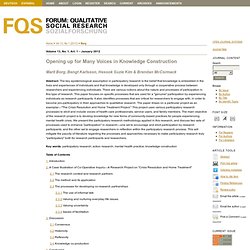
There are various notions about the nature and processes of participation in this type of research. This paper focuses on specific processes that are used for a "genuine" participation by experiencing individuals as research participants. Key words: participatory research; action research; mental health practice; knowledge construction Table of Contents 1. 2. 2.1 The research context and research partners 2.2 The method and its application 2.3 The processes for developing co-research partnerships 2.3.1 The use of informal talk 2.3.3 Valuing uncertainty 3. Interactions - March/April 2012 - Page 58-59.
<div><p><i>ZOIL, available via zoil.codeplex.com. We also thank the German Research Foundation DFG for funding this research project (Grant No. RE 1843/3-1). </i></p><p> </p><p>researchers and practitioners working in the field of interaction design already have access to the kind of technology we employ in our systems and certainly can make more use of it for improving their own work practice. </p><p>However, one of the crucial lessons we learned is that these tools must be designed very carefully, since too much digital functionality may conflict with established work practices and workflows. When we eventually put our systems to the test and compare them with physical practice, we realize that we always have to make compromises—trade-offs between what we aimed to preserve of the material and spatial characteristics and what we had to give up in the favor of using technology to augment these activities with digital power.
Zoom level fullscreen one page two pages share print. Beyond and Around. Proceedings of the 6th ACM SIGCHI conference on Creativity & cognition. The history of the human race is one of increasing intellectual capability.
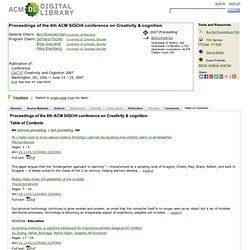
There has been a steady development and accretion of new tools for intellectual work and an increasing distribution of complex activities among many minds. New products, strategy, open innovation, commercialization of technologies, patents, idea generation, customer input in the NPD process, more. How to Foster Group Creativity. Jonah Lehrer is a columnist for the Wall Street Journal, a feature writer for The New Yorker, and author of Imagine: How Creativity Works.
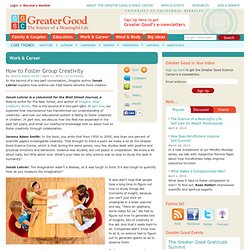
This is the second of a two-part Q&A. In part one, we explored how neuroscience has transformed our understanding of creativity—and how our educational system is failing to foster creativity in children. In part two, we discuss how the field has expanded in the past ten years, and what our newfound knowledge tells us about how to foster creativity through collaboration. Social Media : Positive Technology Journal. Week 2: Connectivism – Creativity & Multicultural Communication. Networks. OpenCities - Opencities. Open Innovation Sabine Brunswicker 4/18/2011. A New Kind Of Social Science For The 21st century. This new frontier in the social sciences is being abetted and even accelerated by three things that are happening.
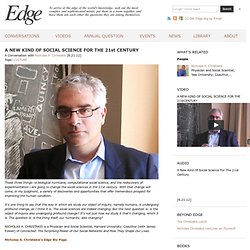
The first is that a biological hurricane is approaching the social sciences. Discoveries in biology are calling into question all kinds of ideas, historically important ideas, in the social sciences—everything from the origin of free will, to collective expression and collective behavior, to the deep origins of basic human behaviors. All of these things are being challenged and elevated by discoveries in biology. For example, as we sequenced the human genome, we did it initially with an eye towards physiologic phenotypes (whether people express certain hormones, or what were the sources of certain variations in risk for diseases like diabetes, etc). Those discoveries are gradually going to be progressively applied to other realms having to do with human behavior. Martin Nowak: a helping hand for evolution. Even by the febrile standards of the evolutionary biology community, Martin Nowak has become a controversial figure.
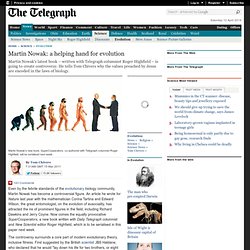
An article he wrote for Nature last year with the mathematician Corina Tartina and Edward Wilson, the great entomologist, on the evolution of eusociality, has attracted the ire of prominent figures in the field, including Richard Dawkins and Jerry Coyne. Now comes the equally provocative SuperCooperators, a new book written with Daily Telegraph columnist and New Scientist editor Roger Highfield, which is to be serialised in this paper next week. The controversy surrounds a core part of modern evolutionary theory, inclusive fitness. This concept is considered central to biology, since it provides the best explanation for why existence is not simply a dog-eat-dog, Darwinian struggle.
But Prof Nowak is doubtful. Instead, Nowak stresses that co-operation and altruism are just as important. Excellence for Cluster Management: European Cluster Collaboration Platform. Europe needs to better mobilize the innovative potential of its companies, especially its SMEs.
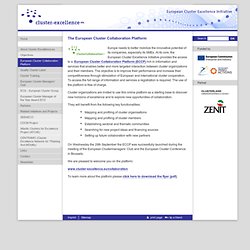
At its core, the European Cluster Excellence Initiative provides the access to a European Cluster Collaboration Platform (ECCP) rich in information and services that enables better and more targeted interaction between cluster organizations and their members. The objective is to improve their performance and increase their competitiveness through stimulation of European and international cluster cooperation.
Start - European Cluster Collaboration Platform. eLeadership, eLearning, eResearch. 19 Informelle Netzwerke sind nicht formlos. Methodspace - home of the Research Methods community.